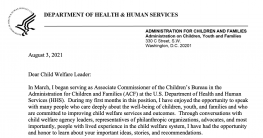
August 3, 2021
Dear Child Welfare Leader:
In March, I began serving as Associate Commissioner of the Children’s Bureau in the Administration for Children and Families (ACF) at the U.S. Department of Health and Human Services (HHS). During my first months in this position, I have enjoyed the opportunity to speak with many people who care deeply about the well-being of children, youth, and families and who are committed to improving child welfare services and outcomes. Through conversations with child welfare agency leaders, representatives of philanthropic organizations, advocates, and most importantly, people with lived experience in the child welfare system, I have had the opportunity and honor to learn about your important ideas, stories, and recommendations.
Many of the people with whom I have had the chance to speak have also asked about my priorities for the work of the Children’s Bureau. I want to take this opportunity to share publicly how focusing on equity will inform all of our work as we move forward.
As you may know, on January 20, 2021, his first day in office, President Biden signed Executive Order 13985, “Advancing Racial Equity and Support for Underserved Communities Through the Federal Government.” This Executive Order defined the term “equity” as the consistent and systematic fair, just, and impartial treatment of all individuals, including those who belong to underserved communities that have been denied such treatment, such as Black, Latino, Indigenous and Native American, Asian Americans and Pacific Islanders, and other persons of color; members of religious minorities; lesbian, gay, bisexual, transgender, and queer persons; persons with disabilities; persons who live in rural areas; and persons otherwise adversely affected by persistent poverty or inequality. Historically, the child welfare system has not served all people equitably, and too often, poverty has been treated as neglect and child maltreatment. The federal government as a whole, and the Children’s Bureau specifically, is committed to advancing equity through our work at the federal level and through our work with states, territories, tribes, and all other grantees.
Being committed to equity means that we must be willing to have difficult conversations. We must also be willing to examine whether and how existing policies and practices have had disparate, and sometimes harmful, impacts on historically underserved and marginalized people. This work requires honesty, openness, and a willingness to make changes. We in the Children’s Bureau have started to hold these challenging conversations, and we are committed to continuing to do so. We are also examining how to conduct our work in ways that best promote equity in child welfare, and we are considering how best to support you, our grantee partners, as you do so as well.
As we work with Children’s Bureau grantees, we will encourage and support you as you begin or continue some of the same work around equity issues that we are undertaking. We understand that your agencies are managing many competing priorities in support of children and families, and we do not intend to add new onerous requirements to your work. Some activities that may be useful to better understand equity issues related to your child welfare population include: analyzing and using program and administrative data to identify equity issues, examining how equity considerations inform planned use of grant funding, considering outreach strategies and efforts to reach underserved populations, and considering ways to measure the degree to which improvements at the aggregate level (e.g., state-wide) translate into improvements for all populations. Working together, we can start to understand how best to address some of these persistent issues in child welfare and begin to make meaningful progress in advancing equity and improving the lives of the children, youth, and families that we serve. I welcome your thoughts and ideas on how to achieve this goal.
Thank you for your continued work on behalf of our nation’s children, youth, and families.
Sincerely,
Aysha E. Schomburg, Esq.
Associate Commissioner
Children’s Bureau